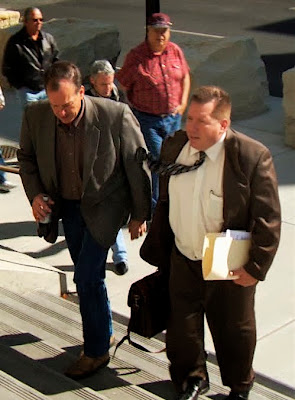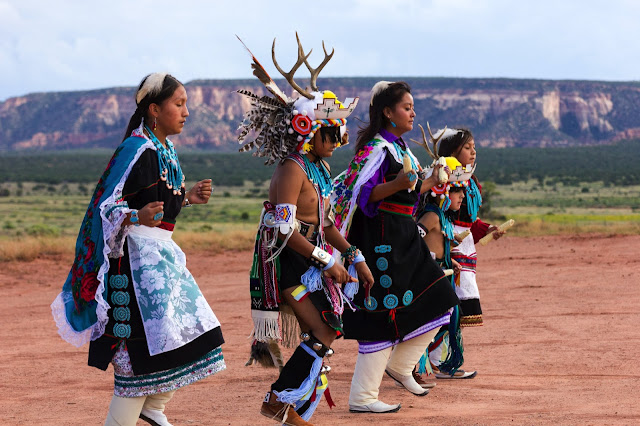South Dakota Voting Rights Suit Dismissed; Plaintiffs Targeted for Costs
This article appeared in Indian Country Today in 2013. For more on topics like this, see my book, American Apartheid: The Native American Struggle....
Plaintiffs and defendants both
claimed victory on August 6, when U.S. District Court Judge Karen Schreier
dismissed the Native voting-rights lawsuit Brooks
v. Gant. Oglala Sioux Tribe members had sued South Dakota state and county
officials, seeking a satellite early-voting and registration office that would
give them elections in their own county and equal to those other South Dakotans
enjoy.
Once the lawsuit got
underway, the state and county defendants promised to use federal Help America
Vote Act (HAVA) money to give the 25 plaintiffs what they wanted through 2018. According
to Judge Schreier, this meant the plaintiffs could no longer show the required
“immediate injury,” so she dismissed their claim. However, she noted, her
decision was “without prejudice,” meaning that, if necessary, the plaintiffs
can sue again.
“They caved,” said OJ
Semans, Rosebud Sioux civil rights leader and co-director of voting-advocacy
group Four Directions. “The court established what the plaintiffs stood up for
and what Four Directions has been fighting for since 2004. Right now, there’s
full equality for most of Pine Ridge Indian Reservation, the largest group of
Indian voters in the state.”
The other side was happy,
too. “We’re feeling extremely pleased, even though the case wasn’t decided on
its merits,” said the counties’ attorney, Sara Frankenstein, of the Rapid City
firm Gunderson Palmer. “Shannon County [which overlaps much of the Oglalas’
Pine Ridge Indian Reservation] gets a satellite office, and the Help America
Vote Act foots the bill.
 At
press time, the lead plaintiff, South Dakota’s secretary of state and head
elections official Jason Gant, had not replied to a request for a comment. Plaintiffs’ attorney Steven Sandven, of Sioux Falls, is shown near left, with Four Directions consultant Bret Healy, far left foreground, and Semans, far left background.
At
press time, the lead plaintiff, South Dakota’s secretary of state and head
elections official Jason Gant, had not replied to a request for a comment. Plaintiffs’ attorney Steven Sandven, of Sioux Falls, is shown near left, with Four Directions consultant Bret Healy, far left foreground, and Semans, far left background.
 At
press time, the lead plaintiff, South Dakota’s secretary of state and head
elections official Jason Gant, had not replied to a request for a comment. Plaintiffs’ attorney Steven Sandven, of Sioux Falls, is shown near left, with Four Directions consultant Bret Healy, far left foreground, and Semans, far left background.
At
press time, the lead plaintiff, South Dakota’s secretary of state and head
elections official Jason Gant, had not replied to a request for a comment. Plaintiffs’ attorney Steven Sandven, of Sioux Falls, is shown near left, with Four Directions consultant Bret Healy, far left foreground, and Semans, far left background.
Payback time
Frankenstein also said that
because the case was dismissed, the defendants get to recover costs and perhaps
fees from the losing parties. “It is a huge financial burden lifted,” she said.
“That’s breathtaking,” said Healy. “They have the insurance public officials
typically hold to cover lawsuits. We all met the plaintiffs via their
depositions—single parents, one with an epileptic child, others caring for
infirm elders, from one of the poorest counties in the nation. The state of
South Dakota and the counties are really going to do this? God have pity on
their souls.”
“Won’t happen,” said Semans.
“It’s just a way to scare off Natives who might want to ask for equal rights in
the future.”
“Granting costs would discourage plaintiffs from bringing suits to enforce the Voting Rights Act,” agreed Laughlin McDonald, director emeritus of the ACLU
Voting Rights Project. He also doubted it would happen.
McDonald, who has litigated
Native enfranchisement cases since 1983, explained that a prevailing party in a federal case is ordinarily entitled to recover costs, but not when it comes to voting rights. “Federal courts have denied for severely limited recovery in those cases,” said McDonald.
Shaking loose HAVA
 Frankenstein said that in
negotiations on her side, she persuaded the secretary of state to change what
she termed “internal policies” and release South Dakota’s HAVA money for the satellite
office in Shannon County, which overlaps much of Pine Ridge. He could do this,
she said, because in May 2008, South Dakota had completed HAVA’s initial
requirement to modernize elections with up-to-date voting machines and the like.
Frankenstein said that in
negotiations on her side, she persuaded the secretary of state to change what
she termed “internal policies” and release South Dakota’s HAVA money for the satellite
office in Shannon County, which overlaps much of Pine Ridge. He could do this,
she said, because in May 2008, South Dakota had completed HAVA’s initial
requirement to modernize elections with up-to-date voting machines and the like.
From then on, Frankenstein
said, the state was free to spend its federal HAVA appropriation on additional
ways to improve elections, including satellite offices. Brooks v. Gant testimony and court documents confirm this. In Judge
Schreier’s opinion, she noted that Shannon County residents had
“minimal” early-voting access until Brooks v.
Gant was
filed.
This
all stands in startling contradiction to
statements by state and county officials over the past several years. They
maintained in many public meetings and national and local press reports that
Shannon County simply couldn’t afford the scope of elections found in other parts
of South Dakota.
“So, as of 2008, money was
no longer an issue—but they kept that quiet,” said Healy.
“This is far from over,” said
Semans. “Until Native Americans are able to participate equally in the
political process, our social and economic challenges will not change.”
At this moment, though,
Native voters should be pleased, said McLaughlin. “They got what they wanted
through the next several elections. It’s a victory.”
Text c. Stephanie Woodard. Photograph of Sandven et al. by William Campbell, courtesy Four Directions. Scales of justice by Perhelion (CCO); currency image from Benutzer:Verwüstung; both via Wikimedia Commons. This article was supported by the George
Polk Center for Investigative Reporting.


